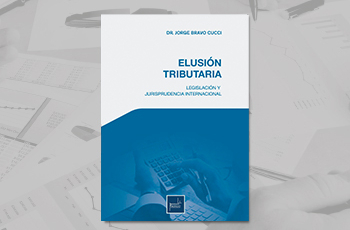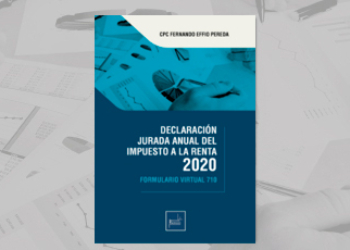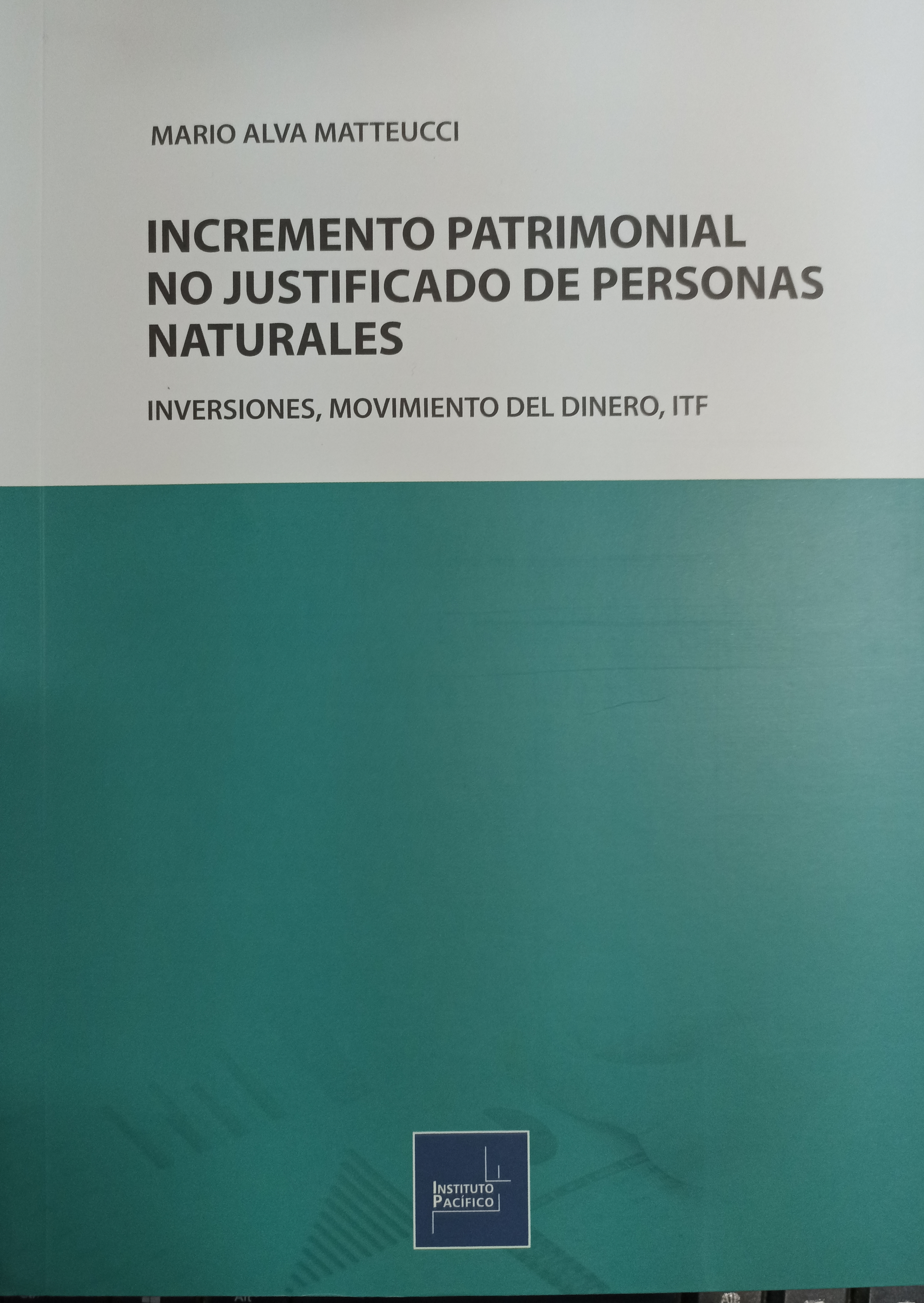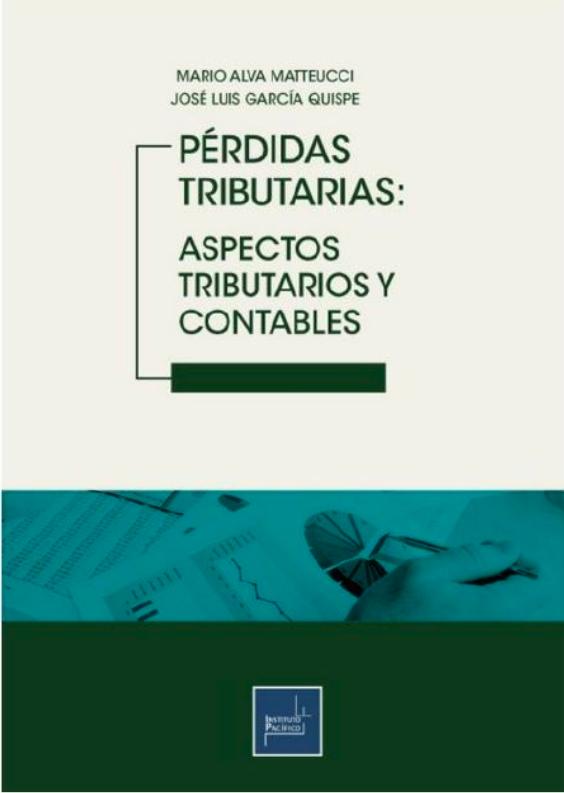[Visto: 2950 veces]
LIBROS DIGITALES SOBRE TEMAS TRIBUTARIOS
DIGITAL BOOKS ON TAX ISSUES
LIBRO: EVASIÓN TRIBUTARIA – SEGUNDA EDICIÓN
Autor: Mario Alva Matteucci
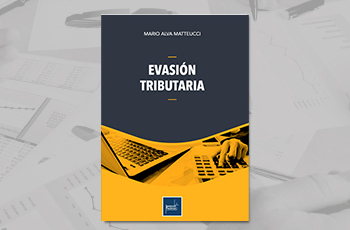
S/ 39.00
El presente libro efectúa un breve análisis de los conceptos vinculados con la evasión tributaria, revisa las causas y consecuencias de la misma, al igual que las normas relacionadas con el delito de defraudación tributaria. Se analiza igualmente los diversos mecanismos para generar la conciencia tributaria en el contribuyente, como también la priorización del cumplimiento voluntario frente al fisco. Como complemento, se revisa la teoría de los juegos relacionándola con la evasión tributaria y la posibilidad que la administración tributaria utilice la Big Data, para descubrir nuevas formas y actos relacionados con la evasión.
Para poder adquirirlo debe ingresar a la siguiente dirección web: https://tienda.institutopacifico.pe/detalle/evasion-tributaria-segunda-edicion
In order to acquire it, you must enter the following web address:
https://tienda.institutopacifico.pe/detalle/evasion-tributaria-segunda-edicion
LIBRO: APLICACIÓN PRÁCTICA DEL IGV E ISC
Autor: Mario Alva Matteucci
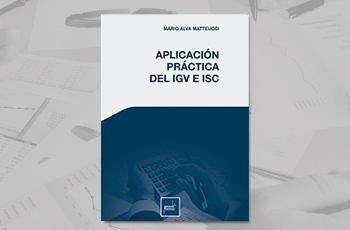
S/ 39.00
La presente obra realiza un análisis detallado de la legislación del impuesto general a las ventas (IGV), efectuando una revisión de cada artículo de la Ley del Impuesto General a las Ventas (LIGV), siempre con sus respectivas concordancias reglamentarias y complementarias. En el análisis dogmático que hemos realizado se incluyen comentarios pertinentes y actualizados acerca de la doctrina nacional y extranjera sobre la materia. Lo antes indicado permitirá una mejor lectura de la LIGV, facilitando así su entendimiento, comprensión y aplicación.
Recordemos que, por su propia naturaleza, el IGV constituye un impuesto plurifásico, el cual se encuentra estructurado sobre la base de la técnica del valor agregado, bajo el método de sustracción, adoptando de manera específica, como método de deducción, el de base financiera. Sobre esta ello, el valor agregado se obtiene del producto de la diferencia que se presenta entre las operaciones de ventas y compras que se llevaron a cabo en un periodo.
Dentro de la estructura ya vista del libro, cada capítulo desarrolla un aspecto teórico del tema e incluye doctrina y comentarios de especialistas. En algunos de ellos se incluyen una aplicación práctica, gráficos y esquemas para una mejor comprensión y entendimiento. También se han incorporado al presente libro informes, oficios y cartas emitidos por la SUNAT, así como sumillas de jurisprudencia emitidas por el Tribunal Fiscal y el Tribunal Constitucional, lo que permitirá al lector conocer a detalle el desarrollo de la LIGV.
Para poder adquirirlo debe ingresar a la siguiente dirección web: https://tienda.institutopacifico.pe/detalle/aplicacion-practica-del-igv-e-isc
In order to acquire it, you must enter the following web address:
https://tienda.institutopacifico.pe/detalle/aplicacion-practica-del-igv-e-isc
LIBRO: MANUAL TRIBUTARIO 2020
Autores: Mario Alva Matteucci, Gabriela del Pilar Ramos Romero
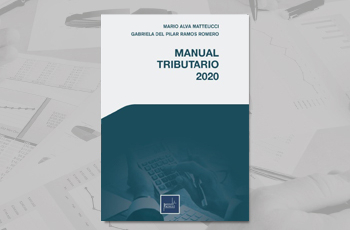
S/ 49.00
La presente publicación titulada Manual Tributario 2020, tiene como objetivo difundir de forma breve y concisa, lo más esencial del régimen tributario peruano, de modo que pueda ser utilizada por los lectores como un instrumento imprescindible de revisión y consulta.
A través de este libro queremos lograr la mayor difusión de las normas tributarias vigentes, para que puedan ser usadas en el logro de sus objetivos en la materia y evitar contingencias derivadas del desconocimiento, permitiendo así a los lectores establecer prácticas preventivas y de planeamiento para sus futuras decisiones.
Los capítulos del libro están acompañados de opiniones emitidas por la Administración Tributaria y jurisprudencia del Tribunal Fiscal dentro de los cuales encontrará temas como marco tributario peruano, Código Tributario, comprobantes de pago, guías de remisión en el traslado de bienes, Gobiernos Locales, contribuciones sociales, Gobierno Central y Sistema de Pago de Obligaciones tributarias (SPOT).
Para poder adquirirlo debe ingresar a la siguiente dirección web:
https://tienda.institutopacifico.pe/detalle/manual-tributario-2020
In order to acquire it, you must enter the following web address:
https://tienda.institutopacifico.pe/detalle/manual-tributario-2020
LIBRO: PÉRDIDAS TRIBUTARIAS: ASPECTOS TRIBUTARIOS Y CONTABLES
Autores: Mario Alva Matteucci, José Luis García Quispe
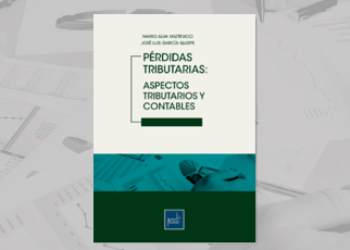
S/ 29.00
La presente obra analiza las pérdidas tributarias que puede generar un contribuyente de tercera categoría, que se encuentra en el Régimen Mype Tributario o en el Régimen General del Impuesto a la Renta.
El análisis que desarrolla esta publicación involucra dos partes claramente diferenciadas pero complementarias a la vez. La primera de ellas trata sobre el tema tributario e identifica el concepto de pérdida, las formas de compensación de pérdidas en la doctrina y los sistemas permitidos en la legislación del impuesto a la renta en el Perú. De igual modo, se señalan las características y reglas aplicables de los sistemas de compensación de pérdidas bajo el sistema A y el sistema B, así como la oportunidad que tienen los contribuyentes de poder variar el sistema elegido inicialmente. También se ha considerado oportuno añadir casos prácticos.
En la segunda parte de esta publicación se analizan los aspectos contables en un escenario de pérdida tributaria. Se resalta el caso excepcional de la compensación de las pérdidas tributarias bajo el sistema A por el ejercicio gravable 2020. Del mismo modo, se responden algunas interrogantes sobre el tema.
Para poder adquirirlo debe ingresar a la siguiente dirección web: https://tienda.institutopacifico.pe/detalle/perdidas-tributarias-aspectos-tributarios-y-contables
In order to acquire it, you must enter the following web address:
https://tienda.institutopacifico.pe/detalle/perdidas-tributarias-aspectos-tributarios-y-contables
LIBRO: INCREMENTO PATRIMONIAL NO JUSTIFICADO. EL PROCEDIMIENTO DE FISCALIZACIÓN EN PERSONAS NATURALES
Autores: Mario Alva Matteucci, Gabriela del Pilar Ramos Romero, Liz Vanessa Luque Livón, Yanet Mamani Yupanqui, Victoria Reyes Puchuri
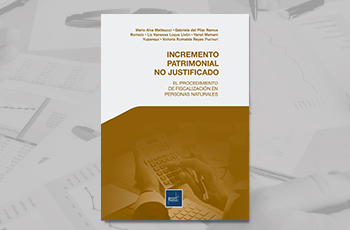
S/ 39.00
S/ 39.00
Si existe un fenómeno que acompaña al tributo desde sus orígenes, ese es la elusión tributaria, que nace como la antítesis de lo que el cumplimiento tributario supone. Han sido cientos los estudios que han tenido —tienen y tendrán— como objeto de sus reflexiones la práctica de eludir, que, a despecho de lo que muchos entienden, no logran esquivar el presupuesto de hecho previsto en la norma, sino encubrir aquel efectivamente realizado, bajo la apariencia de un hecho distinto. En este libro se aborda la elusión desde una perspectiva dogmática, explicando su fenomenología y rasgos característicos, así como analizando la legislación antielusiva nacional y su evolución histórica. Se seleccionan también importantes resoluciones del Tribunal Fiscal que tratan sobre la elusión y se añaden relevantes sentencias internacionales del mismo tema. Ello a los efectos de que el lector pueda comparar el tratamiento tributario que en otros países se ha predicado a esquemas elusivos y pueda extraer de ellas conclusiones relevantes. Finalmente, el libro aborda los esquemas de alto riesgo fiscal planteados por las Administraciones Tributarias de Perú y Chile, los cuales permiten comprender el rumbo de la lucha contra prácticas perniciosas respecto de la recaudación tributaria.
Para poder adquirirlo debe ingresar a la siguiente dirección web:
https://tienda.institutopacifico.pe/detalle/elusion-tributaria
In order to acquire it, you must enter the following web address:
https://tienda.institutopacifico.pe/detalle/elusion-tributaria
LIBRO: AUDITORIA TRIBUTARIA PREVENTIVA Y PROCEDIMIENTO DE FISCALIZACIÓN
Autora: Marysol León Huayanca
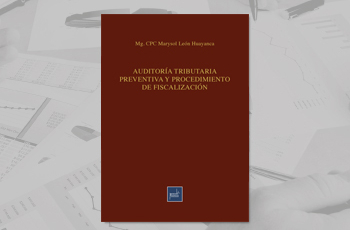
S/ 49.00
LIBRO: DETRACCIONES, RETENCIONES Y PERCEPCIONES, ANÁLISIS Y APLICACIÓN PRÁCTICA
Autor: Fernando Effio Pereda
Autora: Yanet Mamani Yupanqui
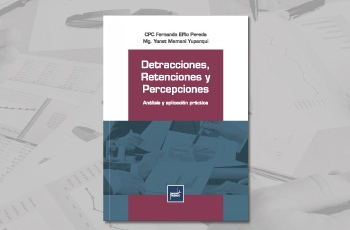
S/ 59.00
Los Sistemas de Detracciones, Retenciones y Percepciones constituyen mecanismos orientados a reducir el gran porcentaje de informalidad existente en el Perú, ya que condicionan a las empresas a que se vean obligadas a realizar o a soportar la detracción, retención o percepción, ello con la finalidad de evitar que el fisco peruano pueda cuestionar su derecho a deducir su crédito fiscal, o que sean sujetos de infracciones, además de utilizarlos como un medio probatorio para la fehaciencia de sus operaciones. Sin embargo, el diario quehacer económico y la diversa casuística han hecho que la regulación normativa de estos sistemas a veces resulte ser insuficiente para su correcta aplicación, siendo necesario que, en muchos casos, se deba recurrir a diversos Informes emitidos por la SUNAT o a Resoluciones dadas por el Tribunal Fiscal. En ese sentido, en la presente publicación vamos a abordar toda la normativa legal pertinente y responder las interrogantes que se generan.
Para poder adquirirlo debe ingresar a la siguiente dirección web:
https://tienda.institutopacifico.pe/detalle/detracciones-retenciones-y-percepciones-analisis-y-aplicacion-practica
In order to acquire it, you must enter the following web address:
https://tienda.institutopacifico.pe/detalle/detracciones-retenciones-y-percepciones-analisis-y-aplicacion-practica
LIBRO: CRITERIOS DE JURISPRUDENCIAS TRIBUTARIA
Autor: Jorge Gabriel Arévalo Mogollón
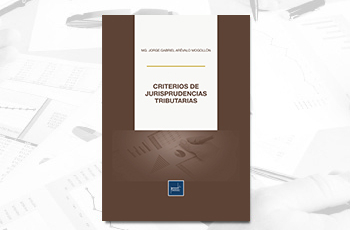
S/ 49.00
La publicación revisa pronunciamientos por el Tribunal Constitucional y la Corte Suprema de Justicia, así como la jurisprudencia de observancia obligatoria y los criterios jurisprudenciales del Tribunal Fiscal. En los capítulos I a III indican la importancia de la jurisprudencia y los tipos de jurisprudencia, también revisa los pronunciamientos por el Tribunal Constitucional y la Corte Suprema de Justicia, del capítulo IV hasta el XV, se reúnen las principales temáticas del Impuesto a la Renta (IR), regímenes especiales del IR, tasa adicional del IR, IGV, tributación municipal e infracciones tributarias. Desde el capítulo XIVI hasta el XIV, se relevan las resoluciones de observancia obligatoria y los pronunciamientos reiterados del Tribunal Fiscal en materia procedimental.
Para poder adquirirlo debe ingresar a la siguiente dirección web:
https://tienda.institutopacifico.pe/detalle/criterios-de-jurisprudencias-tributarias
In order to acquire it, you must enter the following web address:
https://tienda.institutopacifico.pe/detalle/criterios-de-jurisprudencias-tributarias
LIBRO: DECLARACIÓN JURADA ANUAL DEL IMPUESTO A LA RENTA 2020
Autor: Fernando Effio Pereda
S/ 29.00
El cierre del ejercicio implica una serie de preocupaciones y obligaciones para los profesionales contables en general. La elaboración y presentación de los Estados Financieros y la posterior elaboración y presentación de la Declaración Jurada Anual del Impuesto a la Renta del ejercicio cerrado son solo algunas de ellas. Precisamente, con relación a esta última, resulta importante considerar el llenado del formulario virtual que se haya aprobado para tal fin, el que anualmente se actualiza requiriendo nueva información.
Sobre el particular, habría que recordar que el correcto llenado de este formulario resulta importante en la medida de que constituye una declaración jurada tributaria, por lo que debe contener información veraz y correcta. Lo contrario podría generar ciertas infracciones tributarias con sus consabidas sanciones, además que podría servir de instrumento para que la Administración Tributación inicie revisiones fiscales. Recuérdese, por ejemplo, el cruce de información entre los saldos de cuentas por pagar que haya declarado el contribuyente y las cuentas por pagar que declare aquel que tuviera tal derecho.
Bajo este panorama, la presente obra tiene por objeto hacer un análisis detallado de lo que debe contener cada una de las casillas del Formulario Virtual N.° 710 que contiene la Declaración Jurada Anual del Impuesto a la Renta del ejercicio 2020, a propósito de su próximo vencimiento
Para poder adquirirlo debe ingresar a la siguiente dirección web:
In order to acquire it, you must enter the following web address:





